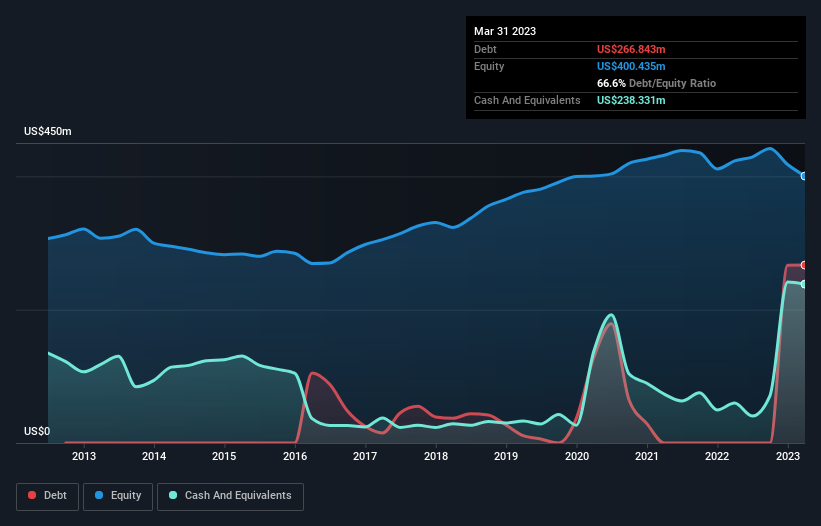- United States
- /
- Healthtech
- /
- NasdaqGS:NXGN
We Think NextGen Healthcare (NASDAQ:NXGN) Can Manage Its Debt With Ease

Some say volatility, rather than debt, is the best way to think about risk as an investor, but Warren Buffett famously said that 'Volatility is far from synonymous with risk.' It's only natural to consider a company's balance sheet when you examine how risky it is, since debt is often involved when a business collapses. As with many other companies NextGen Healthcare, Inc. (NASDAQ:NXGN) makes use of debt. But should shareholders be worried about its use of debt?
When Is Debt Dangerous?
Debt is a tool to help businesses grow, but if a business is incapable of paying off its lenders, then it exists at their mercy. Ultimately, if the company can't fulfill its legal obligations to repay debt, shareholders could walk away with nothing. While that is not too common, we often do see indebted companies permanently diluting shareholders because lenders force them to raise capital at a distressed price. By replacing dilution, though, debt can be an extremely good tool for businesses that need capital to invest in growth at high rates of return. When we think about a company's use of debt, we first look at cash and debt together.
View our latest analysis for NextGen Healthcare
What Is NextGen Healthcare's Debt?
The image below, which you can click on for greater detail, shows that at March 2023 NextGen Healthcare had debt of US$266.8m, up from none in one year. However, because it has a cash reserve of US$238.3m, its net debt is less, at about US$28.5m.

A Look At NextGen Healthcare's Liabilities
We can see from the most recent balance sheet that NextGen Healthcare had liabilities of US$198.1m falling due within a year, and liabilities of US$297.6m due beyond that. Offsetting these obligations, it had cash of US$238.3m as well as receivables valued at US$114.0m due within 12 months. So it has liabilities totalling US$143.3m more than its cash and near-term receivables, combined.
Given NextGen Healthcare has a market capitalization of US$1.06b, it's hard to believe these liabilities pose much threat. But there are sufficient liabilities that we would certainly recommend shareholders continue to monitor the balance sheet, going forward.
We measure a company's debt load relative to its earnings power by looking at its net debt divided by its earnings before interest, tax, depreciation, and amortization (EBITDA) and by calculating how easily its earnings before interest and tax (EBIT) cover its interest expense (interest cover). Thus we consider debt relative to earnings both with and without depreciation and amortization expenses.
NextGen Healthcare has a low net debt to EBITDA ratio of only 0.60. And its EBIT easily covers its interest expense, being 14.2 times the size. So we're pretty relaxed about its super-conservative use of debt. In addition to that, we're happy to report that NextGen Healthcare has boosted its EBIT by 74%, thus reducing the spectre of future debt repayments. When analysing debt levels, the balance sheet is the obvious place to start. But ultimately the future profitability of the business will decide if NextGen Healthcare can strengthen its balance sheet over time. So if you're focused on the future you can check out this free report showing analyst profit forecasts.
Finally, while the tax-man may adore accounting profits, lenders only accept cold hard cash. So it's worth checking how much of that EBIT is backed by free cash flow. Over the last three years, NextGen Healthcare actually produced more free cash flow than EBIT. That sort of strong cash generation warms our hearts like a puppy in a bumblebee suit.
Our View
NextGen Healthcare's interest cover suggests it can handle its debt as easily as Cristiano Ronaldo could score a goal against an under 14's goalkeeper. And that's just the beginning of the good news since its conversion of EBIT to free cash flow is also very heartening. It's also worth noting that NextGen Healthcare is in the Healthcare Services industry, which is often considered to be quite defensive. We think NextGen Healthcare is no more beholden to its lenders, than the birds are to birdwatchers. For investing nerds like us its balance sheet is almost charming. Even though NextGen Healthcare lost money on the bottom line, its positive EBIT suggests the business itself has potential. So you might want to check out how earnings have been trending over the last few years.
If, after all that, you're more interested in a fast growing company with a rock-solid balance sheet, then check out our list of net cash growth stocks without delay.
Valuation is complex, but we're here to simplify it.
Discover if NextGen Healthcare might be undervalued or overvalued with our detailed analysis, featuring fair value estimates, potential risks, dividends, insider trades, and its financial condition.
Access Free AnalysisHave feedback on this article? Concerned about the content? Get in touch with us directly. Alternatively, email editorial-team (at) simplywallst.com.
This article by Simply Wall St is general in nature. We provide commentary based on historical data and analyst forecasts only using an unbiased methodology and our articles are not intended to be financial advice. It does not constitute a recommendation to buy or sell any stock, and does not take account of your objectives, or your financial situation. We aim to bring you long-term focused analysis driven by fundamental data. Note that our analysis may not factor in the latest price-sensitive company announcements or qualitative material. Simply Wall St has no position in any stocks mentioned.
About NasdaqGS:NXGN
NextGen Healthcare
NextGen Healthcare, Inc. provides healthcare technology solutions in the United States.
Adequate balance sheet with moderate growth potential.
Similar Companies
Market Insights
Community Narratives



